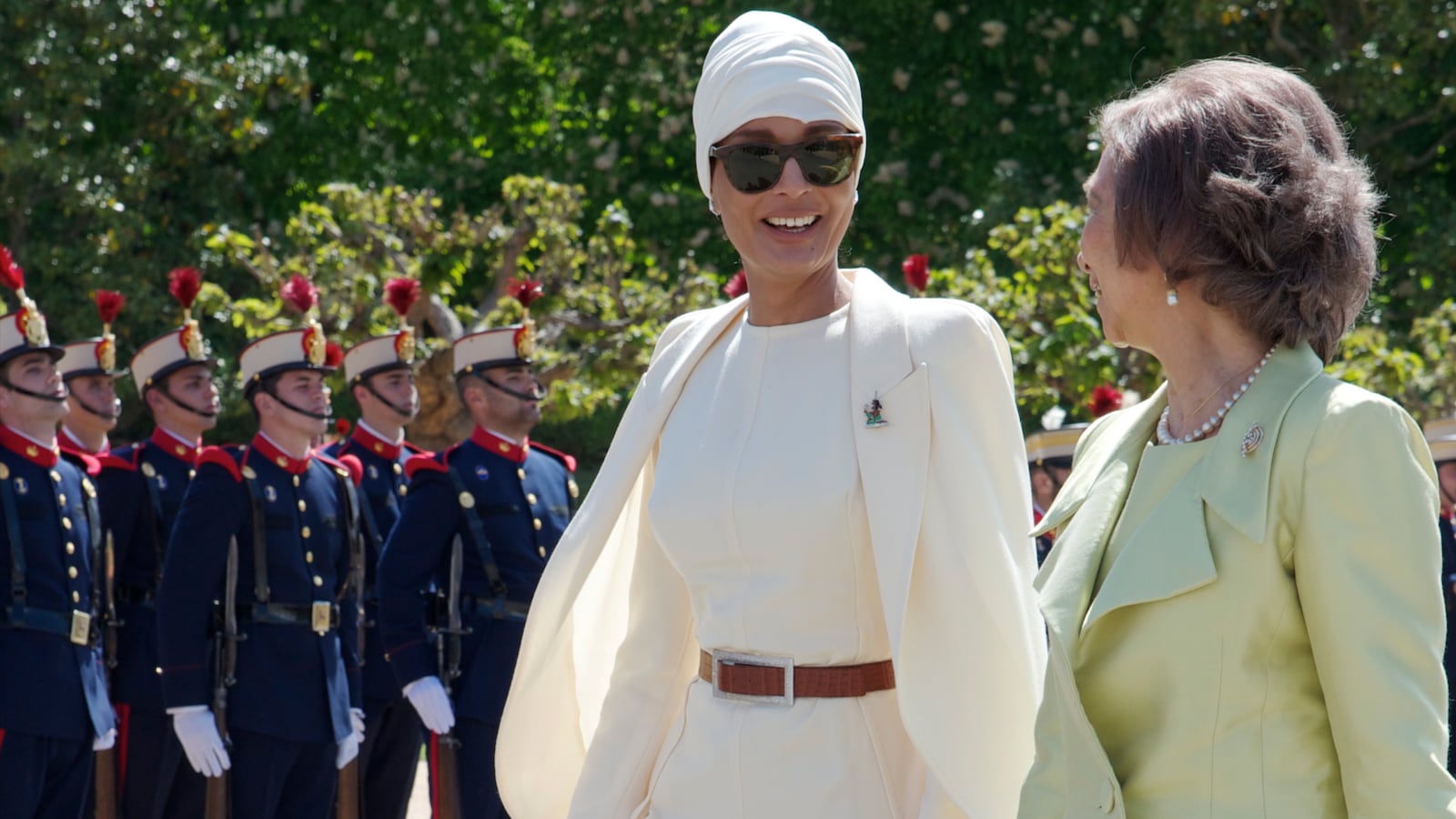
When it comes to the world’s most popular royal, there is no contest. Britain’s Kate Middleton, aka the Duchess of Cambridge, is the undisputed queen, able to sell out dresses just by wearing them and sell out crowds simply by showing up and waving. But there are other royals who inspire America’s aspiring fashionistas.
At the recent Women in the World summit, Jordan’s Queen Rania charmed attendees with her grace and intellect. But even among the educated and impassioned activists, some couldn’t help but be charmed by two of her other qualities: her beauty and impeccable fashion sense. A number of women I spoke with referred to the queen, who has graced numerous best-dressed lists and has even been named the “most beautiful royal consort,” as “the best-dressed woman on the planet.” But when I brought up another well-dressed royal, also a staple of best-dressed lists and a favorite of the fashion set, I was surprised by how few knew who she was. Her name is Sheikha Mozah Bint Nasser Al-Missned, and she was until recently the wife of the emir of Qatar. (Her husband recently stepped down to allow the couple’s oldest son to begin his reign.
The number of slideshows devoted to her is a testament to how beloved Sheikha Mozah’s style is by those who cover fashion for a living. There is even a website devoted solely to her style choices. But despite the adoration, some might even say obsession, of the fashion set—Italian Vogue once named her its “Obsession of the Day”—she has not managed to become a well-known name or royal “brand,” the way Diana once was, and the Duchess of Cambridge and Queen Rania have become.
Like the latter two royals, Sheikha Mozah is not only a fashion trendsetter but also college educated, with a degree from Qatar University, where she was a student when she met and married the emir. Like Queen Rania, she has made education a priority of her work as royal consort. She is chairwoman for the Qatar Foundation for Education, Science, and Community Development. But that may be where the similarities end, and that may be why Sheikha Mozah is not better known in the West and probably never will be.
Experts interviewed by The Daily Beast said that even if a person is beautiful, well-dressed, and living the Cinderella dream as a princess or a queen, a number of factors are necessary to create a bankable “brand.”
According to Liz Dennery Sanders, founder of SheBrand, which advises brands on connecting with female audiences, being aspirational is key to becoming a popular public figure with American women. Of Sheikha Mozah, Sanders said, American women “can’t see themselves as her, so they don’t idolize her the way they do Kate [Middleton].”
Sanders cited a number of reasons why Mozah may not be seen as aspirational, including the fact that she may actually dress too well. While Middleton mixes Topshop and other lower-priced labels with high-end designers such as Alexander McQueen, something first lady Michelle Obama also does, Sheikha Mozah tends to live in high-end designers such as Dior.
“When it comes to gaining attention on today’s style radar, it isn’t about the labels, it’s really about a style sensibility that’s chic, fresh, and inspiring,” said Mikki Taylor, a former beauty editor at Essence magazine and author of the book Commander in Chic, Every Woman’s Guide to Managing Her Style Like a First Lady. Of Obama’s style, Taylor said, “Women everywhere love her ‘classic with a twist’ style because they can source the same designers or the same looks at an accessible price point and have great fun in the process.”
Photographs of Sheikha Mozah wearing J.Crew or other similarly priced designers could go a long way to making her appear more accessible and likable, said Sanders. But her high-priced and highly praised wardrobe is not her only image challenge. “While Sheikha Mozah clearly has beautiful taste, given her circumstances and personal choices, I’m not sure many American women would want to switch places with her,” said Sanders.
Faisal Al-Juburi, a communications consultant who has conducted graduate research at New York University on the changing roles of Arab first ladies, elaborated on those circumstances. Of Sheikha Mozah, he said: “Fashion editors will likely cast a vote in support of her for the International Best Dressed List, but note that photo features are rare due to the fact that she maintains the hijab, regardless of how chic and tastefully done.” He added, “It serves as a barrier to acceptance by the mainstream public—and, therefore, advertisers.”
Al-Juburi touched on one of the primary reasons Sheikha Mozah’s ascendance as a fashion insider’s icon has been so fascinating. Throughout her public life, she has always kept her legs and hair covered, unlike Queen Rania, who “dresses much more like American and European women,” said Sanders. Yet that has not stopped Mozah from appearing fashion forward. According to reports, she will purchase ensembles from high-end designers and have them reworked to adhere to her cultural and religious customs. For instance, a gown that appeared on the runway as strapless or backless will be updated with a closed back or jacket just for her.
“I think it would be hard for mainstream American women to relate to a woman who covers herself in accordance with her religious beliefs and shares her husband with two other women,” said Sanders. And therein lies what may be the greatest challenge Sheikha Mozah may face in being seen as a princess of the world instead of simply a sheikha of Qatar and queen of the fashion set.
“She is the second of three wives, which, despite her power and stature within Qatar, presents an obstacle in disseminating throughout the Western world the portrait of a progressive woman and society,” said Al-Juburi. So despite multiple reality shows about polygamy now airing here in the U.S., the idea that a woman whom American women could respect could be in such a marriage is not considered plausible. (Forget all the high-powered American women we continue to respect who have remained in marriages that have been plagued by affairs.)
If Sheikha Mozah cared to capitalize on her role as a fashion influencer and expand her fan base here in the West, said Sanders, she could do a few things: diversify her wardrobe with more cost conscious labels, and develop an active presence on social media, something Queen Rania has done. “We love a princess and a fairy tale,” Sanders concluded. “Disney has capitalized on this for years.”





